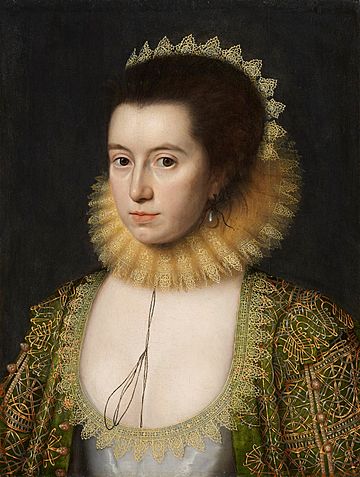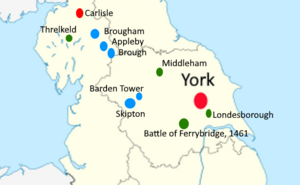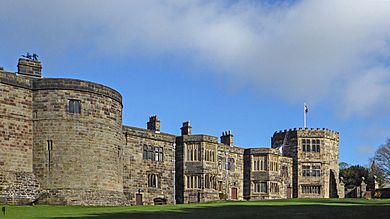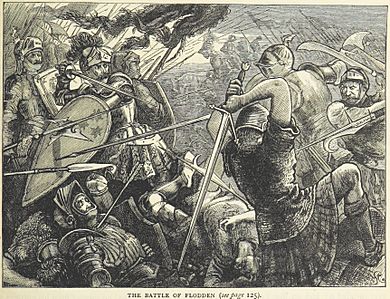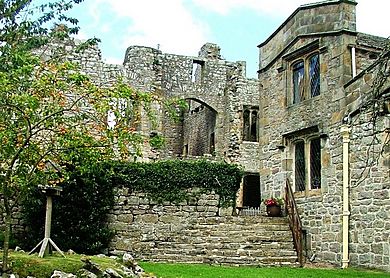Henry Clifford, 10th Baron Clifford facts for kids
Quick facts for kids
Henry Clifford
|
|
|---|---|
| 10th Baron Clifford | |
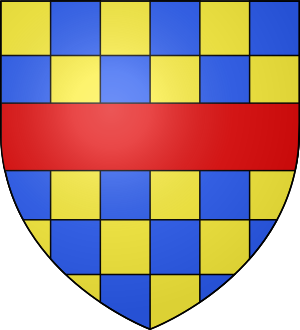
Arms of Clifford, Chequy or and azure a fess gules
|
|
| Predecessor | John Clifford, 9th Baron Clifford |
| Successor | Henry Clifford, 1st Earl of Cumberland |
| Born | c. 1454 |
| Died | 23 April 1523 |
Henry Clifford, 10th Baron Clifford (born around 1454, died 23 April 1523) was an important English nobleman. His father, John Clifford, 9th Baron Clifford, died in the Wars of the Roses when Henry was about five years old. This was a series of civil wars in England.
A popular story says that Henry's mother hid him away. He supposedly grew up living a simple life with a shepherd family. Because of this, he was known as the "shepherd lord." However, historians now think this story might not be entirely true. Henry was signing official documents just a few years after his father's death. He also received a royal pardon from King Edward IV in 1472. He might have tried to stay out of sight, but probably not as much as the legend says.
When Henry Tudor became king in 1485, Henry Clifford's life changed. The new king needed loyal people to help him control the North of England. Clifford became a trusted servant of the Tudor kings. He helped put down rebellions in the north. He also fought against the Scots, including at the important Battle of Flodden in 1513.
Clifford was known for being a bit difficult. He sometimes argued with his neighbors. He also had a tricky relationship with his eldest son, also named Henry. Clifford spent most of his life in the north, away from the royal court. He was interested in astronomy and even built a small castle for observing the stars. He died in 1523, leaving a large fortune to his son.
Contents
Henry Clifford's Early Life
The Clifford family came from Normandy and settled in England after the Norman Conquest in 1066. They became important noblemen in 1299. By the time Henry Clifford was born, England was in a difficult period. The king, Henry VI, was weak. This led to civil war, known as the Wars of the Roses, which started in 1455.
Family's Role in the Wars of the Roses
The Wars of the Roses were fought between two noble families: the Lancastrians and the Yorkists. Henry Clifford's father, John, was a strong supporter of the Lancastrians. He was known for being very fierce in battle.
In December 1460, Henry's father supposedly killed Edmund, Earl of Rutland, the son of the Duke of York. John Clifford himself died a few months later in March 1461. The next day, the Lancastrians lost a huge battle at Towton. The Yorkists won, and Edward IV became king.
Because Henry's father had fought against the new king, his family lost their lands and titles. This was called being "attainted." The Clifford lands were given to other powerful nobles.
The "Shepherd Lord" Story
A popular story says that young Henry Clifford, who was about seven, was hidden away after his father's death. His mother supposedly sent him to live with a trusted family nurse. He worked tending sheep to stay safe and hidden. This is how he got the nickname "shepherd lord."
This story was first written down in the 1500s. Later, Lady Anne Clifford, a descendant, wrote a family history that included this tale. She wanted to show how important women were in keeping the Clifford family going. She believed King Edward IV wanted revenge for his brother's death.
However, many historians now doubt this story. They point out that Henry received a royal pardon in 1472. This means he was no longer in danger from the king. Also, he was publicly mentioned in documents as early as 1466. This suggests he wasn't that hard to find. While he might have kept a low profile for a few years, he probably didn't live as a shepherd.
Historians also note that the story says Henry grew up uneducated. But records show he was able to read and write. He even owned books on law and medicine. He became a skilled manager of his large estates.
Getting Back the Family Lands
The Clifford family lands were very important in the north of England. But after his father's death, Henry couldn't inherit them right away. In 1470, King Edward IV was briefly removed from the throne. Henry VI became king again for a short time. This gave Henry Clifford a chance to get his lands back.
However, King Edward IV soon returned to power. Despite Henry Clifford's family supporting the Lancastrians, King Edward IV gave him a royal pardon in 1472. This meant Henry was forgiven. He was allowed to inherit his mother's family lands. But he couldn't fully get back his father's Clifford lands until later.
Henry VII Becomes King
King Edward IV died in 1483. After some confusion, Richard III became king. But his reign was short. In 1485, Henry Tudor invaded England. He defeated Richard III at the Battle of Bosworth Field and became King Henry VII.
Henry Clifford had stayed in England during these changes. When Henry VII became king, Clifford's situation improved greatly. He was given many local jobs and became a trusted advisor. On 15 September 1485, Henry Clifford attended King Henry VII's first parliament. There, he successfully asked for his father's attainder to be overturned. This meant he could finally inherit all his family's lands and titles. He was also made a knight.
Working for the King in the North
Henry Clifford became a key ally for King Henry VII. The King needed strong, loyal men to control the north of England. This area had been very loyal to the Yorkists for many years. Clifford, who had always supported the Lancastrians and now the Tudors, was a perfect choice.
Clifford was given important roles, like managing the King's lands in the north. He was responsible for keeping the peace. However, he sometimes had trouble with the city of York. The people of York were very proud of their independence. They didn't like outside interference.
In 1487, another rebellion tried to put a fake king, Lambert Simnel, on the throne. Clifford was in charge of protecting York. He brought his soldiers to the city. He tried to fight the rebels outside York, but he was defeated. This was an embarrassing moment for him.
Despite this setback, Clifford continued to serve the King. He was made a Knight of the Bath in 1494. He spent much of his time working in the north. He led a successful attack against the Scots in 1497, capturing Norham Castle. He was also likely part of the Council of the North, a group that helped the king govern the region.
Building Influence and Relationships
Henry Clifford worked hard to improve his family's wealth and influence. He traveled often between his estates in Westmorland and Yorkshire. He repaired and rebuilt castles and other properties. He also tried to build good relationships with his tenants and neighbors. He was known for being generous and hospitable, hosting big celebrations.
Sometimes, his royal service caused problems with his neighbors. For example, he tried to influence elections in York to help the King. But the city officials often resisted him. They told him that his ancestors had never had such power in York.
Clifford also had arguments with other powerful families. In one case, he had a feud with Lord Dacre. The King had to step in and fine them both for fighting. This kind of behavior made the King question Clifford's reliability.
Despite these issues, Clifford became one of the wealthiest nobles in England. He used his money to make alliances through marriages and by hiring local gentlemen to work for him. He also supported local churches and monasteries. He gave them money and even a rare manuscript.
Later Years and Interests
In his later years, Henry Clifford sometimes faced the King's anger. He didn't always keep the peace in the north as the King wanted. He even led local resistance against a royal tax. The King challenged his right to be the High Sheriff of Westmorland. Clifford had to pay large sums of money to the King.
King Henry VII died in 1509. Clifford attended his funeral and the coronation of the new king, Henry VIII. He continued to serve the new king in the north.
War with Scotland
In 1513, war broke out again with Scotland. The Scottish King, James IV, invaded England. Henry Clifford led a large group of soldiers from Yorkshire. He commanded the front part of the English army at the Battle of Flodden. This was a major victory for England. King James IV was killed in the battle. Clifford captured three Scottish cannons and brought them back to decorate Skipton Castle.
Family Life
Henry Clifford married twice. His first wife was Anne St. John. She was a distant cousin of King Henry VII. Their marriage was not always easy. There was even talk of them separating. But they stayed together until Anne died in 1508.
His second wife was Florence Pudsey. Their marriage also had difficulties. Florence even took him to court to ask for her rights as a wife.
Clifford had several children. His main heir, also named Henry, was born around 1493. He was raised at the royal court with the King's son, the future Henry VIII. The relationship between father and son was difficult. Clifford complained that young Henry was wild and spent too much money. He said his son acted "more like a duke than a poor baron's son." He also accused his son of threatening his servants.
Young Henry eventually married Margaret Percy, the daughter of a powerful earl. This marriage helped the Clifford family gain even more wealth and influence.
Personality and Hobbies
Historians describe Henry Clifford as a strong-willed person. He sometimes caused trouble with his neighbors. Some historians call him "eccentric" because of his unusual interests.
Clifford was very interested in astrology and astronomy. He is said to have built Barden Tower as an observatory to watch the stars. He spent a lot of his time there, living a quiet life. This might have been why his wife had problems with him. He also had strong religious interests and spent a lot of money on a new chapel in 1515.
Death and Legacy
By September 1522, Henry Clifford was very sick. He died on 23 April 1523. His widow, Florence, later remarried. Clifford was buried in either Bolton Priory or Shap Abbey.
After his death, it was found that he had a large annual income. He left a lot of money and land to his son, Henry. His son inherited the title of 11th Baron Clifford. Two years later, he was made the Earl of Cumberland. Historians say that the Clifford family became even more important because of Henry Clifford's hard work. He managed his estates carefully and avoided the expensive royal court for most of his life.
Cultural Depictions
The famous poet William Wordsworth wrote two poems about Henry Clifford: Song at the Feast at Brougham Castle and White Doe of Rylstone. These poems romanticized Clifford's life. They described his simple upbringing, his return to power, and his castle building.
The life of Henry Clifford was also turned into an opera called Henry Clifford. The music was written by Isaac Albéniz, and the story was written by Francis Money-Coutts. It was first performed in 1895.
Images for kids
 | Roy Wilkins |
 | John Lewis |
 | Linda Carol Brown |


